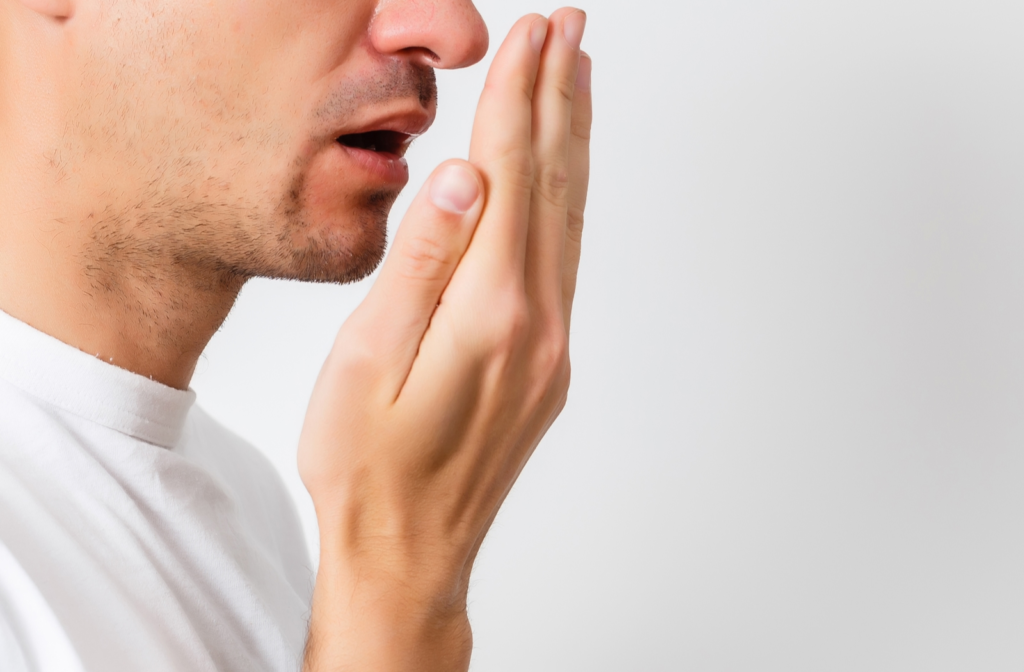
When it comes to maintaining good oral hygiene, most of us follow a simple routine: brush, floss, and rinse with mouthwash. Mouthwash is often considered an essential part of this routine, promising fresh breath and a cleaner mouth.
But have you ever wondered if your mouthwash could be doing more harm than good? In this blog post, we’ll explore how could your mouthwash be bad for you?, how it might contribute to bad breath even after brushing and using mouthwash, and what you should look for in a mouthwash for bad breath.
The Basics of Mouthwash
Mouthwash is a liquid product designed to freshen breath, reduce oral bacteria, and sometimes whiten teeth. It comes in various formulations, with different active ingredients targeting specific oral health issues. Most mouthwashes contain antiseptics like chlorhexidine, cetylpyridinium chloride, or essential oils that help kill bacteria responsible for bad breath and plaque formation.
Types of Mouthwash
- Cosmetic Mouthwash: Primarily used for freshening breath.
- Therapeutic Mouthwash: Contains active ingredients to combat plaque, gingivitis, bad breath, and tooth decay.
Could Your Mouthwash Be Bad for You?
While mouthwash can be beneficial, it’s not without potential drawbacks. Here are some reasons why your mouthwash might be bad for you:
1. Disruption of Oral Microbiome
Your mouth is home to a delicate balance of bacteria, both good and bad. While mouthwash is effective at killing bacteria, it doesn’t discriminate between harmful bacteria and beneficial ones. This disruption of the oral microbiome can lead to various issues, including:
- Increased Risk of Oral Infections: By killing beneficial bacteria, mouthwash can create an environment where harmful bacteria thrive.
- Dry Mouth: Some mouthwashes contain alcohol, which can dry out your mouth. Saliva is crucial for neutralizing acids and washing away food particles; without it, you might experience an increase in tooth decay and gum disease.
2. Alcohol Content
Many mouthwashes contain alcohol as an active ingredient. While alcohol can help kill bacteria, it also has several downsides:
- Dry Mouth: Alcohol can be very drying, leading to decreased saliva production.
- Mucosal Irritation: Alcohol can irritate the soft tissues in your mouth, causing discomfort or even sores with prolonged use.
3. Potential for Masking Underlying Issues
Mouthwash can mask symptoms like bad breath without addressing the root cause. Persistent bad breath even after brushing and mouthwash could indicate underlying issues such as gum disease, cavities, or other health problems.
4. Risk of Overuse
Using mouthwash excessively can lead to several problems:
- Staining: Some mouthwashes, particularly those with chlorhexidine, can cause tooth staining.
- Altered Taste: Overuse of mouthwash can affect your taste buds, leading to an altered sense of taste.

Bad Breath Even After Brushing and Mouthwash
If you find yourself struggling with bad breath even after brushing and using mouthwash, it’s essential to understand that mouthwash might not be addressing the underlying cause. Here are some potential reasons for persistent bad breath:
1. Poor Oral Hygiene
Brushing and using mouthwash alone might not be enough if you’re not flossing or cleaning your tongue. Food particles and bacteria can remain trapped between teeth and on the tongue, contributing to bad breath.
2. Diet
Certain foods and drinks, such as garlic, onions, coffee, and alcohol, can contribute to bad breath. They can linger in your mouth and be absorbed into your bloodstream, causing bad breath even after brushing.
3. Gum Disease
Gum disease is a significant cause of bad breath. Bacteria build up in the pockets between your gums and teeth, producing foul-smelling compounds.
4. Dry Mouth
As mentioned earlier, dry mouth can lead to bad breath. Without sufficient saliva to wash away bacteria and food particles, bad breath can persist.
5. Medical Conditions
Certain medical conditions, such as sinus infections, diabetes, and gastrointestinal issues, can cause bad breath. If your bad breath persists despite good oral hygiene, it might be worth consulting a healthcare professional.
Choosing the Right Mouthwash for Bad Breath
If you decide to use mouthwash as part of your oral hygiene routine, it’s essential to choose the right one. Here are some tips for selecting an effective mouthwash for bad breath:
1. Look for Antibacterial Ingredients
Choose a mouthwash with antibacterial ingredients like cetylpyridinium chloride or essential oils. These can help reduce the bacteria that cause bad breath.
2. Avoid Alcohol-Based Mouthwashes
Opt for alcohol-free mouthwashes to avoid the drying effects of alcohol. Look for mouthwashes that contain xylitol or fluoride instead.
3. Consider Therapeutic Mouthwashes
Therapeutic mouthwashes are designed to target specific oral health issues, such as plaque and gingivitis, which can contribute to bad breath.
4. Check for ADA Seal of Acceptance
Look for the American Dental Association (ADA) Seal of Acceptance on the mouthwash packaging. This seal ensures that the product is safe and effective for its intended use.

Natural Alternatives to Mouthwash
If you’re concerned about the potential downsides of traditional mouthwash, you might consider natural alternatives. Here are some options:
1. Saltwater Rinse
A simple saltwater rinse can help reduce bacteria and soothe irritated gums. Mix a teaspoon of salt in a glass of warm water and rinse your mouth thoroughly.
2. Baking Soda Rinse
Baking soda can neutralize acids and help reduce bacteria. Mix a teaspoon of baking soda in a glass of water and use it as a rinse.
3. Oil Pulling
Oil pulling involves swishing oil (such as coconut or sesame oil) in your mouth for 10-20 minutes. This practice can help reduce bacteria and improve oral health.
4. Herbal Mouthwash
Consider making a homemade herbal mouthwash using ingredients like peppermint, tea tree oil, or clove oil. These natural ingredients have antibacterial properties and can help freshen your breath.
Conclusion
Mouthwash can be a useful addition to your oral hygiene routine, but it’s essential to use it wisely. Overuse or reliance on mouthwash to mask underlying issues can lead to more significant problems down the line.
If you’re experiencing persistent bad breath even after brushing and using mouthwash, it’s crucial to address the root cause, which could range from poor oral hygiene to medical conditions.
When choosing a mouthwash, opt for alcohol-free, antibacterial options and consider the potential impact on your oral microbiome.
Natural alternatives like saltwater rinses and oil pulling can also be effective and gentler on your mouth.
Remember, maintaining good oral hygiene involves more than just using mouthwash. Regular brushing, flossing, tongue cleaning, and dental check-ups are all essential components of a healthy mouth.
By understanding the potential drawbacks of mouthwash and making informed choices, you can ensure that your oral hygiene routine supports your overall health and well-being.


